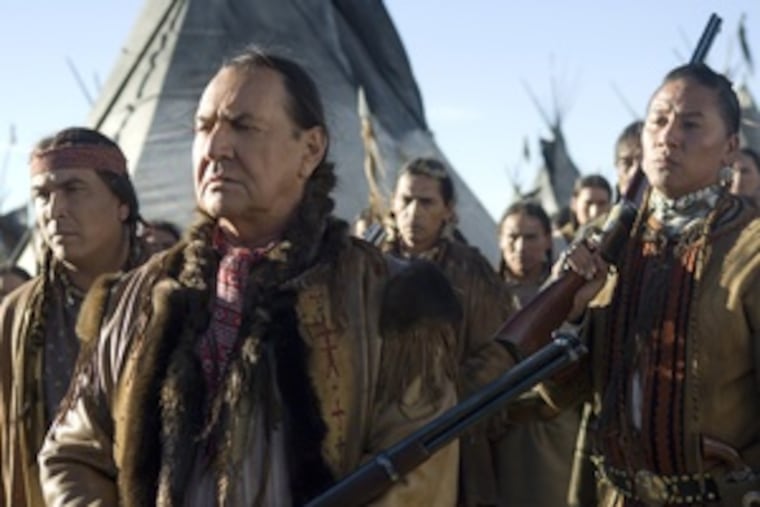Jonathan Storm | Riding back to Wounded Knee
No Sopranos tonight on HBO. Instead of the Mafia at 9 p.m., another genre: Indians! Bury My Heart at Wounded Knee was published 36 years ago, changing much of the country's view of American Indian history. Since then, we've had Dances With Wolves, Into the West, and who knows how many other books, films and TV shows depicting how deceitful U.S. policy was, and how disastrous to the Indians.

No
Sopranos
tonight on HBO. Instead of the Mafia at 9 p.m., another genre: Indians!
Bury My Heart at Wounded Knee was published 36 years ago, changing much of the country's view of American Indian history. Since then, we've had Dances With Wolves, Into the West, and who knows how many other books, films and TV shows depicting how deceitful U.S. policy was, and how disastrous to the Indians.
Adding to the pile: Bury My Heart at Wounded Knee! Now it's an HBO movie, complete with tacked-on love story, featuring a mixed-raced Sioux and a pretty white woman, and some heavy-handed references to present events.
"And what would you have us do?" Gen. George Tecumseh Sherman (Colm Feore in a cameo) asks a liberal senator. "Cut and run?"
Even the senator (Aidan Quinn as Henry Dawes), a supposed good guy, was convinced that the only good Indian was one who had been transformed into a European-American. The film's whole thrust is to instruct us on the wrongheadedness of that idea, teaching that other cultures have their good points, too.
Who wants to listen to people whining that movies take unconscionable liberties with the books they're based on? You can make any movie you want, if you have the money. The important question: Is your movie worth watching? The answer here: Yes, provided you haven't got much else to do in the middle of Memorial Day weekend.
Dee Brown's book covered the whole second half of the 19th century and every tribe from the Apache to the Cheyenne, and even Law & Order kingpin Dick Wolf, who's an executive producer on this project, doesn't have enough money to film all that.
So the filmmakers decided to focus on the Sioux toward the end of the century in the Black Hills, where another HBO project set in the white man's world in the same era, Deadwood, did pretty good business. And they added the love story.
"Everyone felt very strongly that we needed a white character or a part-white, part-Indian character to carry a contemporary, mostly white, audience though this project," Daniel Giat, the scriptwriter, told TV critics at their winter meeting in Los Angeles.
The mostly white contemporary audience that bought 5 million copies of the book didn't need any such thing, but who's splitting feathers?
Charles Eastman, called Ohiyesa as a boy, was a real Sioux Indian, who graduated from Dartmouth and got his medical degree at Boston University and married a Massachusetts poet. The couple met on the Pine Ridge Reservation (not Back East, as shown in the movie, which doesn't mind bending things a bit), ministered to those injured in the Wounded Knee Massacre, after Christmas 1890, and got married after that.
Eastman, apparently, was not quite as emotionally broken by his impressment into white society as the film would have you believe. After Wounded Knee, he was active in recruiting Indians into the YMCA and, though not a principal, is generally credited as being one of the men who helped found the Boy Scouts of America. Eastman and his wife divorced in the 1920s, and he died in 1939, at the age of 80.
Adam Beach, an Ojibwa who has just joined Law & Order: Special Victims Unit as a regular, plays Eastman. Anna Paquin is his wife. Current moviegoers may know her as Rogue from the X-Men movies. Older folks remember that she won the best supporting actress Oscar at age 11, for The Piano.
That was 13 years ago. Neither she nor Beach will win any prizes here, though they're perfectly satisfactory. The best acting comes from August Schellenberg (who is part Mohawk) as Sitting Bull, a man who lived in three or four different worlds in his lifetime. The actor has had practice, playing the same part in a 1996 TNT movie, Crazy Horse.
Beach, Paquin and Schellenberg are all Canadians, but that's OK. The movie was filmed in Alberta, which can be a flat and desolate place. But it's also home to the Canadian Rockies national parks, and it's absolutely beautiful in the film, shot big. Who wouldn't want to try to hang on to this extraordinary patch of land?
Another Law & Order man, Fred Dalton Thompson, plays President Ulysses S. Grant, one of our worst. The former U.S. senator has also been Andrew Jackson, and seems likely to try to play President Fred Dalton Thompson in his next role.
Wolf said Thompson took the Wounded Knee role because "he was as struck by the story as all of us have been, because the resonances in this are not only instructive for our relationships with American Indians but other cultures."
"You talking about Iraq?" someone asked.
"Maybe," said Wolf, but "I think . . . what is the important message, and it's not limited to the United States, it's when any society says to another group - whether it's indigenous, offshore, next door - that our way of life will be better for you, and we have a better plan than you have, you get into real trouble."
It's hard to see Thompson stumping in the Republican primary on that platform, but if he does, then the movie, even if nobody tunes in tonight, will be a success.
Jonathan Storm |
Television Review
Bury My Heart at Wounded Knee
Debuts tonight at 9 on HBO